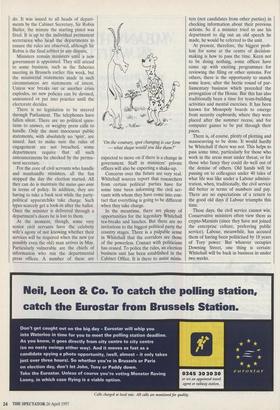MEANWHILE, BACK IN WHITEHALL
Sarah Whitebloom finds out how the
grander civil servants pass the time during the election
YOU WERE an insider, at the centre of events. People of international stature were eager to know your opinion. You travelled the world attending glamorous meetings, and half the fun of it was always knowing far more than you told. There was barely a week when the press was not at the door, and throughout you did your best to hold your man's hand, even wash- ing the dirty linen when required. But that was then. The telephone hardly rings now. You never go out. And no one is interest- ed in your opinion.
No, you are not Captain Mark Phillips, or some celebrity's wife who has been ditched in favour of a younger model, but a senior civil servant. It is only at times such as this that the election widows of Whitehall realise quite how central minis- ters are to the business of government. Of course, things are ticking over nicely in the absence of politicians. There is no danger of the state collapsing; after all, the same people still hold the reins. If politicians were left in charge it would be worrying.
For most civil servants employed in dole offices and the like, there is no change. But in the SW1 homeland of the mandarin, everything effectively froze on the day the election was announced. A strict code to ensure absolute impartiality during the campaign governs everything departments do. It was issued to all heads of depart- ments by the Cabinet Secretary, Sir Robin Butler, the minute the starting pistol was fired. It is up to the individual permanent secretaries who head the departments to ensure the rules are observed, although Sir Robin is the final arbiter in any dispute.
Ministers remain ministers until a new government is appointed. They still attend to some business, such as the fisheries meeting in Brussels earlier this week, but the ministerial statements made in such circumstances are statements of intent. Unless war breaks out or another crisis explodes, no new policies can be devised, announced or put into practice until the electorate decides.
There is no legislation to be steered through Parliament. The telephones have fallen silent. There are no political ques- tions to answer, or weighty press calls to handle. Only the most innocuous public statements, with absolutely no 'spin', are issued. Just to make sure the rules of engagement are not breached, some departments require that all such announcements be checked by the perma- nent secretary.
For the core of civil servants who handle and manhandle ministers, all the fun stopped the day the election started. All they can do is maintain the status quo ante in terms of policy. In addition, they are having to take a back seat while the party- political apparatchiks take charge. Such types scarcely get a look-in after the ballot. Once the minister is delivered through a department's doors he is lost to them.
At the moment, though, some very senior civil servants have the celebrity wife's agony of not knowing whether their services will be required when the new (or possibly even the old) man arrives in May. Particularly vulnerable are the chiefs of information who run the departmental press offices. A number of these are 'On the contrary, spot changing is our forte — what shape would you like them?'
expected to move on if there is a change in government. Staff in ministers' private offices will also be expecting a shake-up.
Concerns over the future are very real. Whitehall sources report that researchers from certain political parties have for some time been informing the civil ser- vants with whom they have come into con- tact that everything is going to be different when they take charge.
In the meantime, there are plenty of opportunities for the legendary Whitehall tea-breaks and lunches. But there are no invitations to the biggest political party the country stages. There is a palpable sense in Whitehall that the corridors are those of the powerless. Contact with politicians has ceased. To police the rules, an election business unit has been established in the Cabinet Office. It is there to assist minis- ters (not candidates from other parties) in checking information about their previous actions. So if a minister tried to use his department to dig out an old speech he made, he would be referred to the unit.
At present, therefore, the biggest prob- lem for some at the centre of decision- making is how to pass the time. Keen not to be doing nothing, some offices have come up with exciting programmes for reviewing the filing or other systems. For others, there is the opportunity to snatch some leave, after the hectic round of par- liamentary business which preceded the prorogation of the House. But this has also traditionally been a time for team-building activities and mental exercises. It has been known for Monopoly boards to emerge from security cupboards, where they were placed after the summer recess, and for computer games to be put through their paces.
There is, of course, plenty of plotting and manoeuvring to be done. It would hardly be Whitehall if there was not. This helps to pass some time, particularly for those who work in the areas most under threat, or for those who fancy they could do well out of the demise of others. Old hands will be passing on to colleagues under 40 tales of what life was like under a Labour adminis- tration, when, traditionally, the civil service did better in terms of numbers and pay. There are no expectations of a return to the good old days if Labour triumphs this time.
These days, the civil service cannot win. Conservative ministers often view them as crypto-Marxists (since they have not joined the enterprise culture, preferring public service). Labour, meanwhile, has accused them of having been politicised by 18 years of Tory power. But whoever occupies Downing Street, one thing is certain: Whitehall will be back in business in under two weeks.



































































 Previous page
Previous page